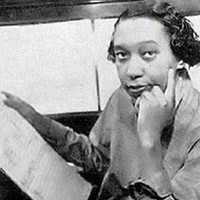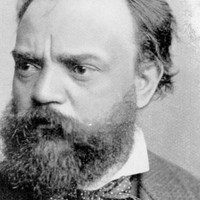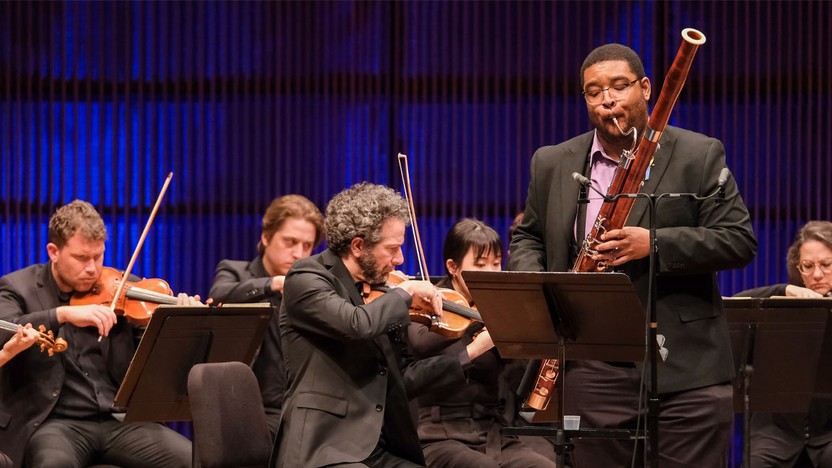Details

Stefan L. Smith
My Young Friend for Bassoon and Chamber Orchestra (SPCO commission)
(Duration: 12 min)
Based off of the poetry of Elvena E. Bowers, My Young Friend depicts a musical story of a close friend of hers struggling to come to terms with his identity.
Set in the musical landscape of the southern Black church, it is a tone poem that describes the inner turmoil faced in both past and present times by those in the LGBTQA+ Black community; specifically targeting the issue of accepting one's identity, in fear of losing the ones you love.
As timely as this piece may seem, the setting of the poem is actually from the 1980s, which was an even more oppressive time for those struggling to be accepted for their queer identity(s) within the macro of society.
Originally commissioned for Bassoon and Piano by the Colburn School in 2022, this new version for Bassoon and Chamber Orchestra has been commissioned by The Saint Paul Chamber Orchestra and Principal Bassoon and grandson, Andrew Brady.
Stefan L. Smith ©2024

Julia Perry
Prelude for Strings (arr. by Zahab)
(Duration: 3 min)
After studying composition and conducting at Westminster Choir College and the Juilliard School, Julia Perry began to make a name for herself in the early 1950s by writing music that drew on spirituals and other traditions born out of the African diaspora. During the first of several European residencies, she studied with the French teacher who shaped so many great American careers, Nadia Boulanger, introducing an international perspective that filtered into Perry’s later concert music.
Perry was still a college student when she first drafted her Prelude for piano in 1946, and she revised it in 1962. The slow melodic phrases bear the influence of spirituals and the blues, but her thick chordal voicings rub against the melodic notes in ways that add nuance and emotional depth.
This version of Perry’s Prelude for string orchestra was arranged by the composer Roger Zahab. As he recalled in a program note, “In the 1980s, I found a copy of her manuscript in the American Music Center. Under the title she had written ‘arrangement for string orchestra available,’ but I have never been able to locate it. I made this arrangement for the University of Pittsburgh Orchestra in August 2020 in her honor.”
Aaron Grad ©2024

Jessie Montgomery
Records from a Vanishing City for Chamber Orchestra
(Duration: 13 min)
Records from a Vanishing City is a tone poem based on my own recollection of the music that surrounded me growing up on Manhattan's Lower East Side in the 80s and 90s. Artists, truth seekers and cultures of all kinds defined our vibrant community. The embracing diversity burst out with an effortless everydayness in block parties, festivals and shin-digs of every sort. Partly because my parents were artists, but also because I just couldn't help it, I soaked up what surrounded me: Latin jazz, alternative rock, Western classical, avant-garde jazz, poetry and Caribbean dance music, to name a few.
A year before completing this work, a very dear family friend passed away and it was decided that I would be the one to inherit a large portion of his eclectic record collection. James Rose was one of the many suns in the Lower East Side cosmos who often hosted parties and generous gatherings for our extended artist family. His record collection was a treasure trove of the great jazz recordings of the 50s, 60s and beyond — he was mad for John Coltrane, but also Miles Davis, Thelonious Monk and-and-and — as well as traditional folk artists from Africa, Asia and South America. In the process of imagining the music for tonight's concert, a specific track on a record of music from Angola caught my ear: a traditional lullaby which is sung in call and response by a women's chorus. This lullaby rang with an uncanny familiarity in me. An adaptation of this lullaby and the rhythmic chant that follows it appears in each of the three main sections of Records.
This piece is dedicated to the memory of James Rose.
Jessie Montgomery ©2017

Antonín Dvořák
Serenade for Strings
(Duration: 27 min)
Antonín Dvořák grew up in a small Bohemian village where his father ran an inn and entertained guests by playing the region’s quintessential folk instrument, the zither. After Dvořák moved to Prague to pursue a career in music, he scraped by any way he could — teaching piano, playing church organ, and gigging with a dance band on the viola, to name a few of the activities that supported his composing. He might have spent the rest of his life in obscurity had it not been for the intervention of a most influential champion, Johannes Brahms, who discovered the young Czech composer when judging a competition.
One work that Dvořák submitted for that competition was the Serenade for Strings that he had composed over twelve days in May of 1875. Brahms was so impressed that he forwarded a stack of scores on to his publisher, who soon commissioned Dvořák’s Slavonic Dances and launched his international career.
To composers in Wolfgang Amadeus Mozart’s era, the Serenade was a form of simple entertainment to be performed outdoors at public gatherings in the evening. By the nineteenth century, composers applied the term more generally to pieces of a pleasing, “night-music” character with a loose assemblage of movements, a format that suited Dvořák’s gift for melodic invention.
Most of the movements of the Serenade for Strings follow a three-part structure, with statements of a primary theme (or group of themes) separated by a contrasting middle section. The opening Moderato demonstrates this simple elegance, forgoing an introduction and developmental transitions, and instead moving without delay from one memorable melody to the next. Singable themes continue to unfurl in the Waltz, Scherzo and Larghetto, the last of which provides a rich and sentimental departure from the Serenade’s cheery disposition. In the Finale, playful quotations help to bring the work full circle.
Aaron Grad ©2024
About This Program
Though Antonín Dvořák’s Serenade for Strings headlines this program around intimate works for chamber orchestra, a new arrangement of Stefan L. Smith’s My Young Friend for Bassoon and Chamber Orchestra lies at its heart. Originally a duet for bassoon and piano commissioned by the Colburn School for SPCO Principal Bassoon Andrew Brady and inspired by original poetry of Brady’s grandmother, this will be the world premiere of the orchestrated version commissioned by the SPCO.

